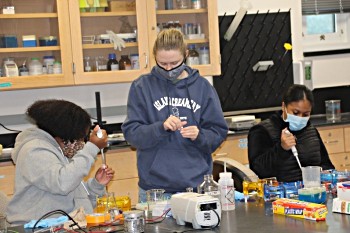
UMES students in the Department of Natural Sciences can now benefit from two recent philanthropic donations totaling over $25,000 and earmarked for student training.
The Integral Scholarship Fund was established with a $7,500 gift from Integral Consulting Corporation to help students defray expenses associated with conducting research. The international environmental consulting firm with an office in Annapolis, Maryland, contacted the department with a desire to help students that have the potential for becoming part of their future workforce.
“This type of funding, resources that can be directly applied to support student research in faculty labs, is the hardest to come by,” said Dr. Jonathan Cumming, chair, UMES Department of Natural Sciences. “Integral is giving back to the community by providing opportunities for UMES students to advance their training in environmental research.”
Funds, he said, can be used for certain equipment, travel to research labs to gain data and learn different research approaches, participation in short courses targeting specific analytical skills and approaches to be used in research, computation time and travel to present research results at national meetings.
The company provides science and engineering insight, strategy and project delivery for health, environmental and natural resource challenges, both past and present. Its scientists and engineers have “applied their multidisciplinary expertise to a wide range of successful projects for business, public sector and nonprofit organizations,” some of which include clean energy, groundwater flow and transport, remediation and ecosystem impacts.
The department also received $20,000 from the National Marine Sanctuary Foundation to fund an internship program between UMES and the National Oceanographic and Atmospheric Administration. Students in the internship program will work on NOAA programs for one or two semesters, giving them insight into the inner workings of agencies that protect marine ecosystems and protect citizens in coastal communities,” Cumming said.
“Our students will have unique opportunities to work in various positions within the Office of Response and Restoration at NOAA,” he said. “This will expose them to alternative careers in environmental science, such as working on marine debris remediation, emergency response and disaster preparation.”
The Foundation’s mission is to protect the nation’s oceans, coasts and Great Lakes, preserving species and their homes. They work at several levels, including conservation and restoration, community engagement and education, and outreach.

